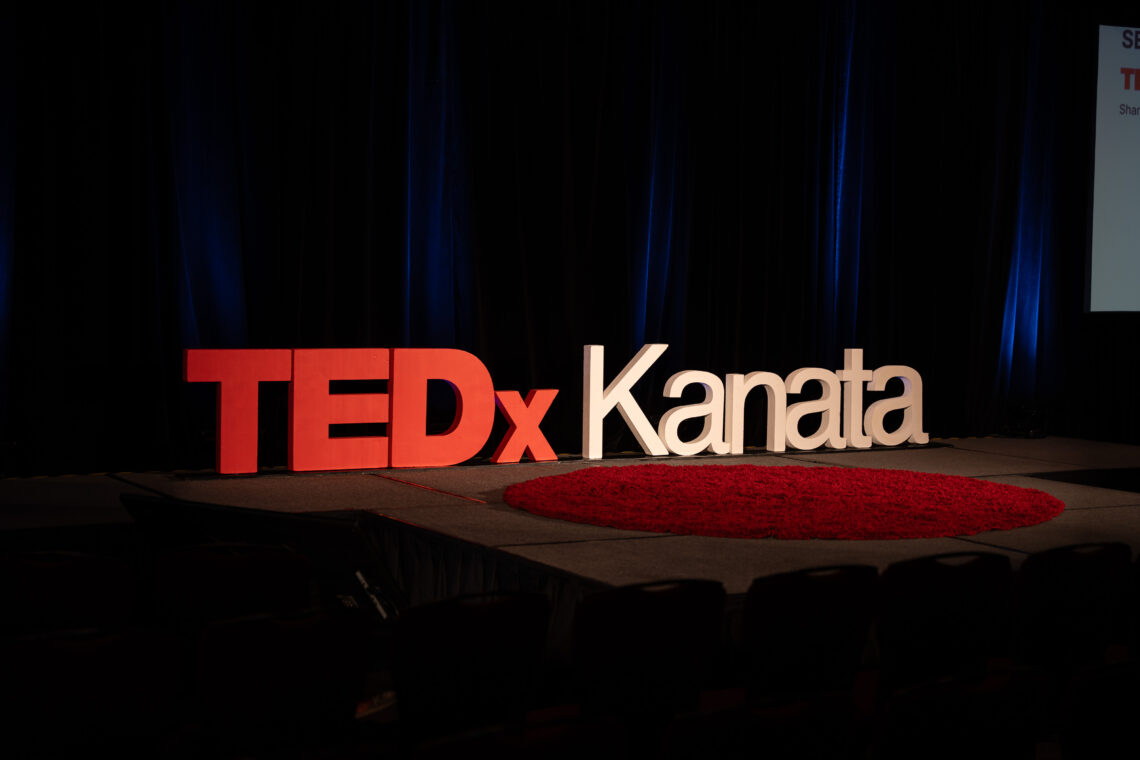
On May 15th, TEDxKanata ignited discussions on the ever-changing landscape of our world, all wrapped up under the theme: EMERGE. As a 100% volunteer-driven organization rooted in the heart of the Kanata North Technology Park, the goal was to spotlight remarkable individuals and their groundbreaking ideas. With the only necessity being to share an “idea worth spreading”, our speakers all emerged with vastly different topics that addressed everything from cleantech to financial wellness, AI-enhanced communication, ageism, and more.
A vibrant community of innovators, thinkers, and doers gathered at the Brookstreet Hotel for networking opportunities, and delectable food and beverages.
TEDxKanata was an electrifying event, featuring an exceptional lineup of speakers who captured attendees’ minds and inspired action. Here’s a list of the incredible voices that took to the stage.
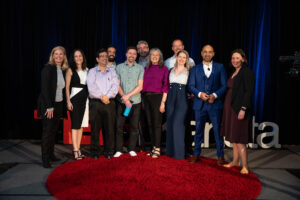
Arun Munje: “Whatever field you are in, look for opportunities where you can help humanity emerge into a more equitable future.”
Almost four years ago, Arun founded AIHEARU, inspired by his brother Anand’s desire to communicate and the barriers he faced in doing so as a person with cerebral palsy. Arun noticed that his brother Amit could perfectly interpret Anand, and thought “how can I use AI to create an Amit for every Anand?”. Using a small language model, AI technology, and other recently emerged tools, Anand is now able to be understood. When Anand speaks, real-time captions are generated to help others interpret his speech.
Arun spoke about this invention, its applications, his inspiration, and the way that we can use technology to foster true inclusion. Learn more about Arun, Anand, Amit, and AIHEARU in this CBC article.
Ksenia Yadav: “Artificial Intelligence is a force. Let’s harness this force for good.”
Ksenia spoke to the audience about the need to push forward despite fears in the AI field, likening tech progress to a flowing river where all global players can either go with the flow or stagnate.
The biggest fears surrounding the next steps of AI? Ksenia identified two: AIs ability to deepen existing biases and further isolate marginalized communities, and the impact that AI will have on jobs. But, Ksenia reminded, AI is not inherently biased – it must be programmed this way: humans still have the power. Meanwhile, throughout human existence, the way we work has been continuously disrupted by new technologies. AI can give us the gift of time by streamlining our work and allowing for more of those truly human moments – the “eureka” of a new idea, being moved by art and people, time with our loved ones, and so much more.
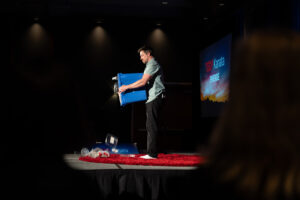
Geoffrey MacKay: “Humans are garbage.”
Geoffrey made a statement when he poured his recycling bin out on stage. “Humans are garbage – ‘litter-ally.’ Why do we have to work so hard to not produce waste?” Comparing the cyclical ways of nature to the finite path of garbage, Geoffrey emphasized that garbage is not natural, and that solving our waste problem is imperative.
As a start, Geoffrey is finding a new way to replace single-use plastic with reusable containers by rethinking the way we grocery shop. His invention stores bulk foods and allows shoppers to dispense the amount they need into the containers of their choosing, all while displaying the real-time weight and cost of the dispensed product.
Helen Hirsh Spence: “Aging is the ultimate triumph of living.”
As the night’s emcee, Omar Dabaghi-Pacheco, posed: “Helen. Is there anything you haven’t done?” Traveling the world, summiting Kilimanjaro, teaching, learning, and moving through life with a longevity mindset are just a few of Helen’s accomplishments. Modern science has significantly raised the average lifespan of humans, and Helen refers to this as a ‘longevity bonus’: the extra years for robust, dynamic life that our ancestors didn’t have just one or two generations before us.
Still, ageism is so embedded in our society that Helen noticed she had subconsciously bought into the biases used against the aging population and was now applying them to herself. Armed with this knowledge, she began to fight back.
“Aging is the ultimate triumph of living,” Helen remarked. And with so many awesome adventures in her past and still on the horizon: we all want to be like Helen when we grow up.
Byron Holland: “The story of the Internet is still being written, and we’re the authors. Let’s build the internet that we and future generations need and deserve.”
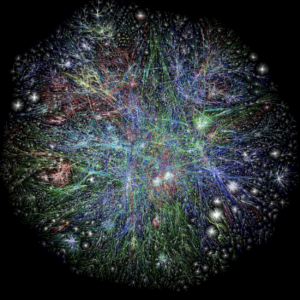
“It’s beautiful, right? That’s the internet,” Byron opened, showing the audience the image to the right that looks like countless colorful synapses, “almost like a galaxy”. The internet is one of the most revolutionary inventions in the history of mankind, but as we’ve come to know, it’s certainly not without its dangers. Two of the biggest concerns are cybersecurity and mental health. To save the internet, Byron believes we’ll need three key things to happen: regulation, education, and proper implementation of technologies.
Heather Coleman: “If we’re financially well, we’re happier and healthier. In order to get our minds right, we need to get our money right.”
We all go to work for one big reason, and Heather gets it: the money. Financial stress is the number one thing that Canadians say is weighing on them, and statistics show that this is not exclusive to lower-income families. “It’s that ‘more money, more problems’, right?” Heather said. While the importance of company culture continues to grow, Heather encourages companies not to stop at ‘muffin Tuesdays’, but to get real about the kind of support employees need and how to provide it. The dream is to see more companies adopting financial wellness plans and helping employees manage what they’re paid. While financial literacy education in Canada lags, responsible companies should do their best to fill this gap. They will see their payoff with employees who are less stressed and more focused.
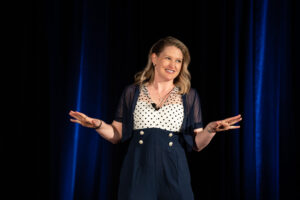
With a fully sold-out crowd and 100% attendance at the Brookstreet Hotel, the energy in Kanata was at an all-time high. As a community packed with “ideas worth spreading” and eager to listen to the schemes and triumphs of others, TEDxKanata was no doubt a resounding success. This was the eighth TEDxKanata event, and the organizers hope to see its return next year.
Thank you to our incredible event partners who made TEDxKanata possible. We couldn’t have done it without you:
🌟 Presenting Sponsor: Kanata North Business Association
🥇 Gold Level Sponsor: Warner Bros Discovery
🥈 Silver Level Sponsor: Wesley Clover
🥉 Bronze Level Sponsors: Fidus, Syntronic
💻 Website Partner: Marvel & Snap
If you were unable to attend, fret not! All speaker videos will be accessible on the TEDxKanata YouTube channel in a few weeks.
Written by Julia Lewis and Hannah Manierka
Photography by Ian Holmes, Creative Captures Photo & Video.
